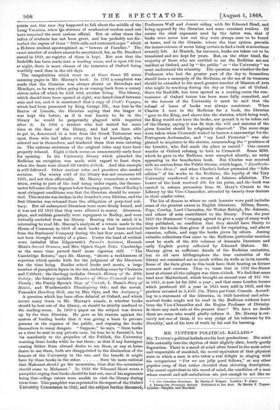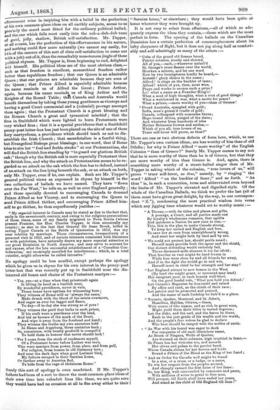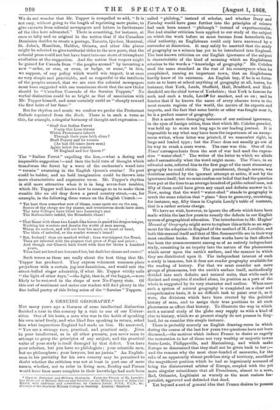MR. TUPPER'S POLITICAL BALLADS.*
MR. TUPPER'S political ballads are his best productions. His mind falls naturally into the rhythm of their slightly elate, hurdy-gurdy dogmatism. There is a mood of mind often found in the most sober and respectable of mankind, the moral equivalent of that physical state in which a man is who takes a real delight in singing with his companions "For we are jolly good fellows," or any other popular song of that rather elevated than elevating description. The moral equivalent to this mood of mind, the condition of a man whose conceit and self-satisfaction are just enough to act like an • I. Our Canadian Dominion. By Martin P. Tupper. Loudon: F. Alger. 2. Twenty-One Protestant Ballads. Published in the Bock. By Martin F. Tapper. London: Shnpkin and Morahan.
effervescent wine in inspiring him with a belief in the perfection of his own common-place ideas on all earthly subjects, seems to us prec's2ly the mood most fitted for the ordinary political ballad, and the one which falls most easily into the rub-a-dub-dub tune of good, jolly, shallow, British self-satisfaction. Mr. Tupper, at all events, has the perfection of this effervescence in his nature, and nothing could flow more naturally (we cannot say easily, for i tis of the essence of this sort of elate self-satisfaction to come out with a jolt) out of it, than the remarkably monotonous jingle of these Folitical rhymes. Mr. Tupper is, from beginning to end, delighted wit himself. His political ideas are of the most obvious class,— Bach as that freedom is excellent, monarchical freedom rather better than republican freedom ; that our Queen is an admirable Queen ; that our princes are admirable because they are sons of the Queen ; that Prince Alfred is especially admirable because his name reminds us of Alfred the Great ; Prince Arthur, again, because his name reminds us of King Arthur and the Knights of the Round Table ; tlaft Canada and Australia would benefit themselves by taking these young gentlemen as viceroys and having a good Court ceremonial and a (colonial) peerage amongst them again ; that the Protestant Church is a great blessing and the Roman Church a great and tyrannical mischief ; that the fires in Smithfield which were lighted to burn Protestants were very wicked fires ; that it is a special providence that a Smithfield penny-post letter-box has just been placed on the site of one of these fiery martyrdoms, a providence which should teach us not to dis- establish the Irish Church ; that aacerdotalism is a fearful thing, but Evangelical Bishops great blessings; in one word, that if Rome
tries to aim her "foul and feeble stroke" at our Protestantism, she will find the British lion standing by "to guard our glorious British oak;" though why the British oak is more especially Protestant than the British lion, and why the attack on Protestantism seems to be re-
garded as an attack on the oak which the lion has to defend, instead of an attack on the lion lying beneath the oak, or an attack on both, only Mr. Tupper, even if he, can explain. Such are Mr. Tupper's general political views as expressed in rhyme by himself in the two collections of ballads we have named. They have "flown over the Far West," he tells us, as well as over England generally ; and those specially devoted to encouraging Canada to demand Prince Alfred as her Viceroy, and to encouraging the Queen to send Prince Alfred thither, and encouraging Prince Alfred him-
self to go thither, he thus superfluously justifies :— " My especial interest in Canada may be stated as due to the fact that, early in the seventeenth century, and owing to the religious persecutions of those times, some of my family migrated to Nova Scotia (whose present Premier, the Hon. Charles Tupper, is thus ancestrally my cousin); as also to the fact that General Sir Isaac Brook, killed in saving Upper Canada at the Battle of Queenston in 1812, was my near relation by marriage. These circumstances, irrespectively of a personal visit in 1851, and of certain interests connected with literature or with patriotism, have naturally drawn my more especial attention to our great Dominion in North America ; and may serve to account for and excuse, after the late successful establishment of a 'Canadian Con- federation,' my seemingly uncalled-for interference ; which, in a total outsider, might otherwise be called intrusive."
No apology could be less needful, except perhaps the apology which he gives us in rhyme for his own interest in the penny-post letter-box that was recently put up in Smithfield near the dis- interred old bones and chains of the Protestant martyrs :—
" Yes, yes—at a time when that priestcraft again
Is lifting its head as a basilisk near, By wonderful providence, never in vain, These bones have uprisen for witnessing here ; They witness of Rome still as 'always the same,' Made drunk with the blood of the saints evermore, And eager as ever for faggot and flame, To-day—if to-day she was strong as of yore !
"They witness the peril that lurks in each priest, If his craft were a pestilence over the land, And bid us beware of the mark of the Beast, And wipe it away from the forehead and hand ; They witness the truths my own ancestors held In Hesse and Augsburg, three centuries back ; So, conscience, with hearty goodwill is compell'd To hold them in honour that never should lack!
"For I come from the stock of confessors myself,
Of a Protestant house before Luther was born,
Who were martyrs from power, from place, and from pelf, For religion, from homes in old Germany torn ; And near the dark days when good Latimer bled, My fathers escaped to their Sarnian home, Or further away to America fled, To hide from the rage of idolatrous Rome."
Surely this sort of apology is even unadvised. If Mr. Tupper's fathers had been of a sort to throw the most common-place ideas of their own time into rubadub lines like these, we are quite sure they would have had no occasion at all to flee away either to their
" Sarnian home," or elsewhere ; they would have been quite at. home wherever they were brought up.
It is not easy to select from effusions,—all of which so ade- quately express the ideas they contain,—those which are the most perfect in form. The opening of the ballads on the Canadian Dominion has a certain perfection of commonplaceness about ita lofty eloquence of flight, but it does not jog along half as comfort- ably and self-admiringly as many of the others :—
" Cubs of the grand old lioness brood, .
Patriot colonies, sturdy and shrewd, All of you,—each,—wherever unfurl'd St. George's cross flames over the world, Hearken a minute, and let one word
Now by two hemispheres loudly be heard,— ALFRED! glory shines in the name ;
Alfred ! it rings on the buckler of fame; Alfred! which of you, then, most wise, Prays and works to secure such a prize ?
Lo! what a name as a Founder-King's!
What a seed of high thoughts, what a root of good things !
What a watchword in war, what a motto for peace !
What a prince,—more worthy of you—than of Greece !
"Proud Australia, spangled with gold ; India, man's gemm'd cradle of gold ; Canada colleagued with comrades brave; Hope-bound Africa, purged of the slave; And wherever from hundreds of isles Mother Britannia frowns and amiles,— Which of you all, true lovers of us, Truer self-lover will prove, as thus?"
There are one or two obvious defects of form here, which, to use Mr. Tupper's own curious idiom, are less worthy of him than of old Dibdin ; for why is Prince Alfred "more worthy." of the English Colonies "than of Greece ?" Surely Mr. Tupper means to say nut that he is more worthy of them than he is of Greece, but that they are more worthy of him than Greece is. And, again, there is something more worthy of a street-ballad singer than of Mr. Tupper in asking which of the colonies, "true lovers of us," will prove "truer self-lover, as thus," namely, by "ringing" the word ' Alfred ' "on the buckler of fame ;" and so forth. "As thus" is, in such a connection, terse and abbreviated even beyond the limits of Mr. Tupper's elevated and dignified style. Of the whole of the Canadian Ballads, we think we prefer the last (all of them must have given great delight, by the way, to our correspon- dent "Z."), condensing the most practical wisdom into verso which any jigging tune whatever would set to worthy music :— " A Throne,—with its titles and places and gifts,
A peerage, a Court, and all parties made one By loyalty's wholesome romance, that uplifts And quickens a Nation its new race to run,— This, this is the plan to make Canada strong, To keep her united and English and free, To save her at once from unneighbourly wrong, And start her aright both by laud and by sea.
"We could not protect her, should perils assail ; Herself must provide both the spear and the shield, Our distant defending would certainly fail, Three-thousand-mile absence is too far afield : That frontier so vast might be hard frozen in While foes were close by and all friends far away, And if in the fight she would go in and win,
Herself must in chief be her strength and her stay!
"Let England attract to new homes in the West (By land she might grant, or unrented may lend) Her emigrant poor, in such bounty woll-blest, On the good feudal rule, What you hold you defend: Let Canada's Magnates be honoured and raised By office and rank, as the chiefs of their race ; Let patriot zeal be promoted and praised, And the name of each lordship be link'd to a place.
"Toronto, Quebec, Montreal, and St. John's, Hamilton, Halifax, Ottawa,—these, With scores of like names, and as rich in great sons, Might yield them their titles in varied degrees ; Lot the duke, and the earl, and the baron be there, Each in the just grade of his wealth and his worth, And tho people's free voices be glad to declare Who best should bo ranged with tho nobles of earth. • "As War with his laurel was eager to deck For conquests of old each illustrious name, As Brock of Niagara, Wolfe of Quebec,
Are throned on their columns, high trophied in fame,—
So Peace has her victories too, and accords Her olives and palms to the patriot band, Whom Canada claims for her heroes and lords Round a Prince of the Blood as the King of her Land ; "And an Order for Canada well might be found In a star, or a cross, or a badge, or a name, To win her respect from the peoples around, And cheaply reward the first heirs of her fame : So, her King, well surrounded by commons and peers, With millions of acres to grant to free men,
Will prosper, till Earth shall have ended her years, And stand as the child of Old England till then !"
We do not wonder that Mr. Tupper is compelled to add,." It is not easy, without going to the length of reprinting mere praise, to give extracts from colonial newspapers and letters in furtherance of the idea here advocated." There is something, for instance, at once so lofty and so original in the notion that if the Canadian Dominion decides to create a peerage, Toronto, Quebec, Montreal, St. John's, Hamilton, Halifax, Ottawa, and other like places might be selected to give territorial titles to the new peers, that the colonial press could not but have burst into one shout of triumphant exultation at the suggestion. And the notion that respect might be gained for Canada from "the peoples around" by inventing a new "order, or star, or cross, or badge, or name," in lieu, we suppose, of any policy which would win respect, is at once no very simple and practicable, and so respectful to the intellects of the peoples around, that we are sure the colonial newspapers must have suggested with one unanimous shout that the new Order should be "Canadian Comrade of the Sarnian Tuppers." No verbal distinction could be so bright as that of association with Mr. Tupper himself, and none certainly could so "cheaply reward the first heirs of her fame."
But for rhythm and music we confess we prefer the Protestant Ballads reprinted from the Rock. There is in such a verse as this, for example, a singular harmony of thought and expression :—
"Shall that Italian Ferret Usurp this Lion-throne
Which Protestants inherit Through their pure faith alone ?
Shall Popery and its vermin (As bad old times have seen) Again infest the ermine Of England and her Queen ?"
'The "Italian Ferret" expelling the lion,—what a daring and impossible suggestion !—and then the bold turn of thought which transforms the ferret by a wave of the enchanter's wand into 4' vermin" swarming in the English Queen's ermine ! No poet -could be bolder, and no bold imagination could be thrown into more characteristic and expressive verse. Mr. Tupper's rhythm is still more attractive when it is in long seven-feet iambics, which Mr. Tupper well knows how to manage so as to make them rumble like an old dray down a paved country street,—as, for example, in the following three verses on the English Church
Yet hast thou somewhat now of blame, some spots are on the sun, Scores of thy clergy are thy shame, and treacherous deeds have done, Thy very Colleges have lifted into Learning's seat The Rationalistic infidel, the Ritualistic cheat!
4' That Beast with those two Lamb-like horns to guard his dragon tongue, Working his wonders and deceits the world of men among,
Whom we eschew, and will not bear his mark on heart or hand, The blain of unbelief, or the scarlet woman's brand!
." But, Ireland ! thou art marked withal ; thou worshippest the Beast, Thou art infected with the plagues that grow of Pope and priest ; And though our Church hath dwelt with thee for thrice a hundred years,
Thou hut not loved nor honoured her, but dealt her shame and sneers!"
Such verses as these are really about the best thing that Mr. 'Tupper has produced. They express vehement common-place prejudices with a certain jog-trot fanaticism, and would suit the .street-ballad singer admirably, if what Mr. Tupper wittily calls 4‘ the light of other days,"—the light, that is, of the faggot,—were likely to be restored in the shape of new No-Popery riots. Of this sort of sentiment and metre our readers will find plenty in the fine ballad poetry of this living scion of the " Sarnian " Tuppers.
































 Previous page
Previous page